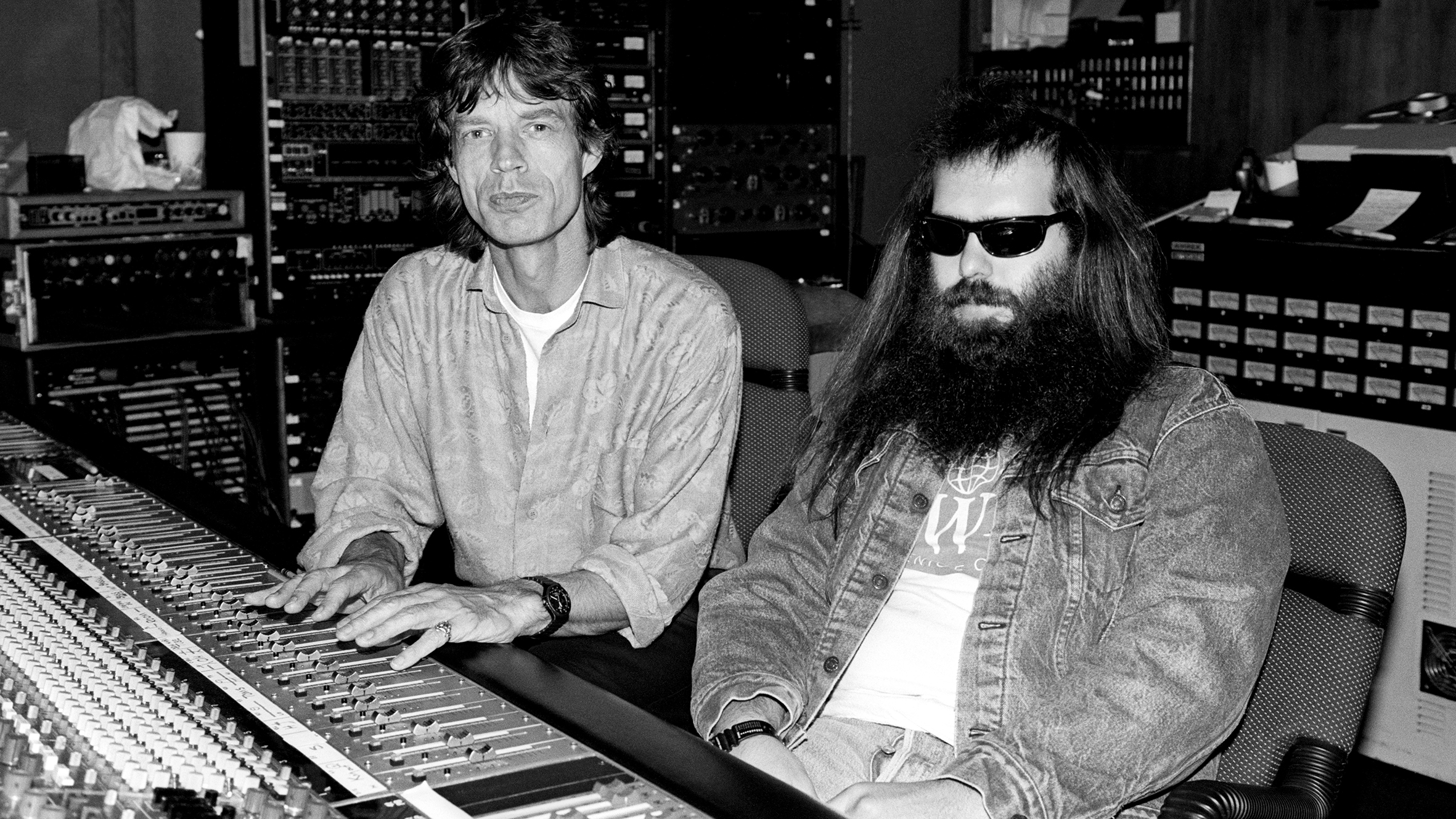"I have no technical ability, and I know nothing about music": Solving the mystery of Rick Rubin, the superproducer who says he doesn’t know how to use a mixing desk
How can a producer that's worked with Paul McCartney, Johnny Cash and Jay-Z have no technical ability - and is he a fraud, or a genius?

There are only a handful of producers in musical history that have become household names through production alone, rising to prominence without writing and recording their own music. And among that rare few, there is only one that claims he has no technical ability, knows nothing about music, and doesn’t even know how to use a mixing desk: Rick Rubin.
Whether Rubin’s puzzling statements are true or not - a question we’ll return to in due course - they’re an illustrative example of the producer’s inscrutable allure, the guru-like mystique that has had artists of the highest calibre knocking at his studio door for decades. Rubin’s worked with them all: everyone from Paul McCartney, Johnny Cash and Neil Young to Ed Sheeran, Jay-Z and Adele has made use of his talents, and his Wikipedia production discography stretches even longer than his shaggy white beard. But how did he get here?
Rubin was born in 1963, spending formative years playing in punk bands at garage shows, before heading to New York University in the early ‘80s and discovering the flourishing sound of hip-hop. It was at university, in his dorm room, that Rubin founded Def Jam Recordings, the now-legendary hip-hop label that’s home to Public Enemy, LL Cool J and Pusha T.
Linking up with DJ Jazzy Jay, Rubin began his production career in earnest, putting together his first joint in 1983 with T La Rock and Jazzy Jay’s It’s Yours. Even this early on, his signature style was evident; stripped-back and sparse but impactful, its essence was captured in the credit he applied to early recordings that read “Reduced by Rick Rubin”.

Def Jam swiftly began to take off, partnering with major labels and expanding its roster to include Slayer and the Beastie Boys, both of whom worked with Rubin. He began to channel influences from his background in rock music into hip-hop, a groundbreaking fusion that would gift hip-hop mainstream credibility with the Rubin-produced Run-DMC’s cover of Aerosmith’s Walk This Way.
Rubin left Def Jam and headed west to Los Angeles, setting up a new label and honing his talents as a producer. Working from now-legendary recording studios - first The Mansion, a historic property rumoured to be haunted, and later the storied Shangri-La - he sculpted the sound of records for Slayer, Johnny Cash and the Red Hot Chili Peppers, among many others. The decades that followed saw Rubin rack up hit after hit and Grammy after Grammy, developing his minimalist style while gradually building the monolithic reputation that accompanies him today.
Fast forward to 2023, and Rubin’s notorious interview on 60 Minutes surrounding the publication of his book The Creative Act: A Way of Being, a quasi-spiritual guide to creativity that finds Rubin sharing his wisdom through cryptic aphorisms like: "The act of creation is an attempt to enter a mysterious realm. Art is our portal to the unseen world".
Get the MusicRadar Newsletter
Want all the hottest music and gear news, reviews, deals, features and more, direct to your inbox? Sign up here.
Discussing his abilities as a producer with the show’s host, Rubin was asked if he played any instruments. "Barely," he responds. Rubin's then asked if he even knows how to use a mixing desk. "No," he answers. "I have no technical ability, and I know nothing about music."
How can a producer that’s worked with this many huge artists, on this many iconic records, have no technical ability? While we’re inclined to take Rubin’s claims with a hefty pinch of salt (he visibly operates a mixing desk in the documentary series McCartney 3, 2, 1, for one) we believe they're more of a mischievous diversion than an outright lie, shifting the focus away from technical considerations such as compressor settings and EQ curves and towards bold artistic choices driven by passion and instinct.
Rubin's claims question the notion of what exactly it means to be a producer
In fact, Rubin's claims question the notion of what exactly it means to be a producer. Is a producer merely someone who sets up mics, plugs in cables, and hits record - or someone who arranges audio clips in a DAW? What exactly does Rubin get up to in Shangri-La, if he’s not doing these things? “I know what I like and what I don't like. I'm decisive about what I like and what I don't like," he tells 60 Minutes, when asked this very question. "The confidence that I have in my taste, and my ability to express what I feel, has proven helpful for artists”.
Whether he has technical ability or not, it's clear that Rubin’s talents lie in his capacity to act as a kind of artistic guide, a slovenly, bearded sherpa on the mountain of creativity, doggedly leading his collaborators towards their best ideas and helping them discard their worst ones. It’s revealing that Rubin once told The Washington Post, “I don’t even know what a traditional producer is, or does”. Perhaps his true genius lies in redefining the term altogether.
Rick Rubin in four tracks
1. Beastie Boys - (You Gotta) Fight For Your Right (To Party) (1986)

Rubin met the Beastie Boys when they were still in high school and was later recruited as their DJ. After an ear infection forced him to drop out of their tour, Rubin shifted his focus to production, working on the project that would become Licensed To Ill. “What Rick did was pretty incredible," Mike D said. "He took our weird rap songs, and he made them sound clean and big and polished - and ready for the radio. They were more like real anthems, and less like a joke."
2. Red Hot Chili Peppers - Give It Away (1991)
The Chili’s Give It Away was recorded in Rubin’s 10-bedroom residential studio, The Mansion. The band holed up in the supposedly haunted building for 30 days during the making of Blood Sugar Sex Majik, documenting the process in the film Funky Monks, which features a scene showing Rubin in full guru mode, counselling Flea on the song’s bassline.
3. Johnny Cash - Hurt (2002)
Johnny Cash’s haunting take on Nine Inch Nails’ Hurt is perhaps one of the greatest cover songs of all time, but recording the song wasn’t his idea - it was Rubin’s. “When I heard the record, I said: ‘I can’t do that song. It’s not my style’”, Cash said, but Rubin insisted, framing his husky, cigarette-scarred vocals in a bare-bones arrangement that amplifies their emotional intensity tenfold.
4. Jay-Z - 99 Problems (2003)
“I’m thinking maybe we start a capella,” Rubin says to Jay-Z in the documentary footage for the rapper’s The Black Album. “That’s money,” replies Jay, and he wasn’t wrong: the song went on to win a Grammy and its acapella intro became one of the rapper’s most iconic hooks. Another moment of Rubin genius immortalized on film, this is a defining example of the producer’s uncanny ability to strip away the bullshit and hone in on what makes an artist great, making a song about that and that alone.



I'm MusicRadar's Tech Editor, working across everything from product news and gear-focused features to artist interviews and tech tutorials. I love electronic music and I'm perpetually fascinated by the tools we use to make it. When I'm not behind my laptop keyboard, you'll probably find me behind a MIDI keyboard, carefully crafting the beginnings of another project that I'll ultimately abandon to the creative graveyard that is my overstuffed hard drive.



![Red Hot Chili Peppers - Give It Away [Official Music Video] - YouTube](https://img.youtube.com/vi/Mr_uHJPUlO8/maxresdefault.jpg)

![Jay-Z - 99 Problems (EXPLICIT) [1080P Remastered] (2003) - YouTube](https://img.youtube.com/vi/il7DAixsKrQ/maxresdefault.jpg)









